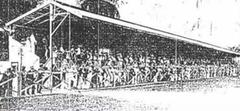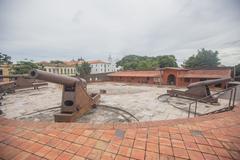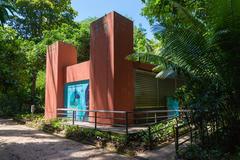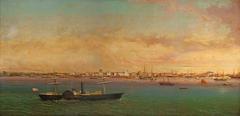
Antônio Lemos Palace: Visiting Hours, Tickets, and Attractions in Belém, Brazil
Date: 04/07/2025
Introduction
Antônio Lemos Palace, a jewel at the heart of Belém’s Cidade Velha, stands as a testament to the city’s rich political and cultural legacy. Originally built during the Amazon rubber boom, this iconic neoclassical and eclectic structure houses both the City Hall and the Museu de Arte de Belém (MABE). Visitors can expect a blend of architectural splendor, civic history, and artistic immersion, all set within a vibrant historic corridor surrounded by other key landmarks (IPHAN, 2024; Lonely Planet).
This comprehensive guide covers everything you need to know about visiting Antônio Lemos Palace: its historical context, architectural evolution, practical visitor information, accessibility, nearby attractions, and recommendations for making the most of your experience.
Table of Contents
- Historical Context and Construction Timeline
- Architectural Evolution: Neoclassicism to Eclecticism
- Cultural and Urban Significance
- Visiting Information: Hours, Tickets, and Facilities
- Highlights of the Visitor Experience
- Practical Tips and Nearby Attractions
- Events, Guided Tours, and Virtual Experiences
- Frequently Asked Questions (FAQ)
- Summary and Final Tips
- References
Historical Context and Construction Timeline
Construction of Antônio Lemos Palace began in 1860, at the height of Belém’s economic expansion fueled by the Amazon rubber trade. Designed by José Coelho da Gama Abreu, the palace was inaugurated in 1883, even before its completion in 1885. The event was marked by the emancipation of 47 enslaved people, reflecting a pivotal moment in Brazilian history (IPHAN, 2024).
Originally conceived as Belém’s municipal headquarters, the building soon became a symbol of the city’s aspirations to rival major European urban centers.
Architectural Evolution: Neoclassicism to Eclecticism
Neoclassical Foundations
The palace’s architecture is rooted in neoclassicism, evident in its symmetrical façade, imposing columns, and monumental staircase dividing two internal courtyards. The use of grand pediments, decorative urns, and statuary signified Belém’s desire for cosmopolitan status (IPHAN, 2024).
Eclectic Enhancements
Under the transformative mayorship of Antônio Lemos (1897–1912), the palace underwent major renovations. Lemos introduced eclectic elements, including lavish interiors, imported materials, modern amenities, and ornate decorative details to reflect the city’s rubber wealth and European influences. The palace became a showpiece of Belém’s modernization (IPHAN, 2024).
Restoration and Preservation
Over the decades, functional modifications led to some loss of original features. A significant restoration (2022–2024) focused on structural preservation, modernization, and accessibility, ensuring the palace’s continued relevance as both a public building and cultural site (portalamazonia.com).
Cultural and Urban Significance
Antônio Lemos Palace stands as a symbol of Belém’s civic power and urban transformation. Its role as City Hall and home to MABE bridges governance with cultural engagement. The palace is a focal point within Belém’s historic center, forming a cultural corridor with the Theatro da Paz and Ver-o-Peso Market (Lonely Planet).
The museum’s collections and exhibitions highlight the region’s artistic and historical legacy, while the palace itself remains a venue for civic events, debates, and ceremonies.
Visiting Information: Hours, Tickets, and Facilities
Location
- Address: Praça Dom Pedro II, 2, Cidade Velha, Belém, PA (whichmuseum.com)
- Easily accessible by public transport, taxi, or on foot from other historical sites.
Visiting Hours
- Museu de Arte de Belém (MABE):
- Tuesday to Friday: 9:30 a.m. – 4:30 p.m.
- Occasional weekend openings for special events
- Closed Mondays and some holidays (visit details)
Admission & Tickets
- General Admission: Free
- Guided Tours: Available on request; contact the museum for scheduling (official Mabe site)
- Special Exhibitions: May require a nominal fee
Facilities & Accessibility
- Ramps and accessible restrooms available following 2024 renovations
- Air-conditioned galleries and cloakrooms
- Cloth slippers provided to protect historic flooring
- No on-site café, but refreshments are nearby at Ver-o-Peso Market
Highlights of the Visitor Experience
- Grand Staircase: Monumental centerpiece dividing two courtyards
- Museum Galleries: Nearly 2,000 artworks spanning 19th-century to contemporary Brazilian artists
- Historical Interiors: Mosaic floors, stucco ceilings, crystal chandeliers, and painted iron wall coverings
- Special Exhibitions: Rotating displays and cultural programming
- Council Chambers: Preserved civic spaces reflecting early 20th-century governance
- Stained Glass Windows: Amazonian flora and fauna motifs
Practical Tips and Nearby Attractions
Language
Portuguese is the primary language; basic phrases or translation apps are helpful (travelpander.com).
Dress Code
Light, breathable clothing and comfortable shoes are recommended. Respectful attire and use of slippers inside are mandatory (lonelyplanet.com).
Best Time to Visit
- Dry season: July to December for comfortable weather
- Weekday mornings for fewer crowds
- January anniversary celebrations for extra cultural events (hurfpostbrasil.com)
Safety
The district is well-patrolled, but visitors should stay vigilant and secure personal belongings (holidaymaker.ai).
Nearby Attractions
- Theatro da Paz: Guided tours of a neoclassical theater
- Ver-o-Peso Market: Amazonian produce, crafts, and cuisine
- Museu do Estado do Pará (Palácio Lauro Sodré): Regional history and art
- Forte do Castelo: 17th-century fort with city views (hurfpostbrasil.com)
Events, Guided Tours, and Virtual Experiences
- Guided Tours: Highly recommended for historical and artistic context; book in advance through the museum
- Special Events: Art exhibitions, educational programs, and civic ceremonies
- Virtual Resources: Interactive maps, images, and virtual previews on museum and city tourism websites
Frequently Asked Questions (FAQ)
Q: What are visiting hours?
A: Tuesday to Friday, 9:30 a.m.–4:30 p.m.; occasional weekend openings; closed Mondays and holidays.
Q: Is admission free?
A: Yes, general entry is free; certain exhibitions may charge a small fee.
Q: Is the palace accessible?
A: Recent renovations improve accessibility, but some historic areas may remain limited.
Q: Are guided tours available?
A: Yes, in Portuguese, with some materials in English and Spanish.
Q: Can I take photos?
A: Non-flash photography is allowed in most areas; check signage and staff instructions.
Summary and Final Tips
Antônio Lemos Palace is a cornerstone of Belém’s heritage, blending architectural beauty, civic history, and cultural vibrancy. Recent restorations offer a welcoming, accessible environment for all visitors. Take advantage of guided tours, explore the museum’s collections, and don’t miss the cultural richness of the surrounding historic district. For up-to-date information and personalized recommendations, download the Audiala app and check official tourism resources before your visit.
References
- Antônio Lemos Palace in Belém: Visiting Hours, Tickets, and Historical Significance (IPHAN, 2024)
- Palácio Antônio Lemos: A Complete Visitor’s Guide (official Mabe site)
- Antônio Lemos Palace Visiting Hours, Tickets, and Guide (portalamazonia.com)
- Lonely Planet: Antônio Lemos Palace
- Brazil City Guides: Belém Travel Guide
- WhichMuseum: Antônio Lemos Palace
- Liberal Amazon: Belém - Gateway to the Amazon for Four Centuries











